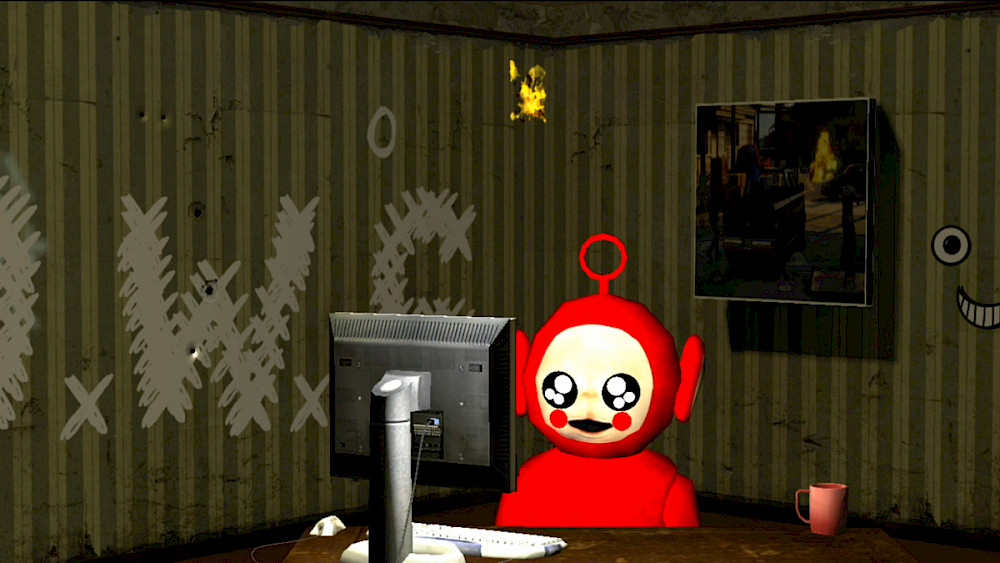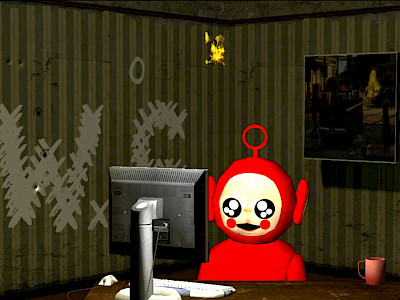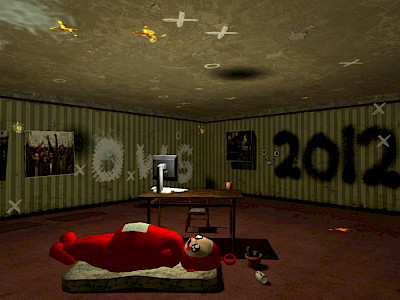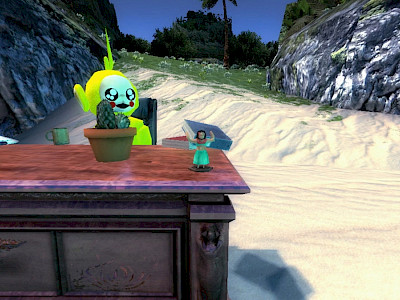07 — 09.05.2016
Jisun Kim Seoul
Climax of the Next Scene
audiovisual performance
Korean → EN | ⧖ 1h | € 16 / € 13 | Meet the artist after the performance on 8/05
What role do games play in our society? For South Korean artist Jisun Kim, computer games are a microcosm, as is theatre, providing a way of looking at the world. Climax of the Next Scene is a remarkable video triptych that leads the viewers into a parallel universe of online games. We follow two avatars on an adventure through video games like Grand Theft Auto and Minecraft. The innocent characters kill and die as if nothing is awry, using their instincts in a battle between the will to survive and blood thirst. The images are as sharp as the line between fiction and reality is blurry. The virtual operations seem to be guided by the decisions of living persons. Real violence invades the weightless universe of the games, where globalised terror is then conducted. Can we escape through the cracks in the system? Do we want to find the exit?
Climax of the Next Scene
“There’ve been several such revolutions (like the Copernican revolution), I said. Newton introduced the idea of motion without a prime mover. Darwin presented evidence for design without a designer. Computers show us thought without a thinker. And now, cognitive science is shaking up our fundamental ideas of who and what we are. It is presenting nothing less than a vision of spirit without a soul.”
Karl Schroeder
The relationship between virtuality and reality is based on the premise that the former is derived from the latter and tries to approach it, although the former is not real, and that the former is supposed to follow the latter; in other words, virtuality is a reproduction of reality. Some innocent fool derived from Otaku (Deok-hu, in Korean) [people with obsessive interests], however, doesn’t necessarily think that way. They consider virtual space and physical space on a similar level, not as having an inevitable causal or hierarchical relationship.
If the world is defined by existence in this way, the world of the Deok-hu is a combination of the worlds they’re crazy about and the usual reality they cannot avoid. In other words, the world is a complex one consisting of multiple realities. To use Foucault’s terminology, it is not the ‘heterotopia’ in reality but the ‘heterotopia/heterochrony of realities’ wherein the various realities are mixed. For game-Deok-hu, there is an order. Their number-one reality is the ‘real-reality’ in which we are supposed to believe that our body and mind are placed. This entity of reality is threatened by another reality as well as by itself, to such an extent as to become stressed with a double emphasis on real-reality. Most rational beings might agree with the substantial importance of the number-one reality. And game players, who live in games, know that the world is an illusion, that digital virtuality is made by game companies and is ultimately a product of capitalism. We need to pay more attention to this ambivalent attitude, not to the extreme dichotomy.
There may be a variety of opinions on it. Žižek used the expression ‘the pleasure in capitalist ideology’, which means that even if consumers participate in the system of ideology functioning against their faith and know that fact, they simply enjoy themselves in it. In other words, they pleasantly appropriate certain content, including animation, game, film, performance, and art, although they know the limitations of these cultural products and the problems of ideology. Like a kid with a fetish – “I know (the absence), but” – they recognise the lack, but hold to tentatively confirming the fetish and enjoying themselves in it.
It doesn’t matter, even though the game players’ unique actions – which this performance emphasises – don’t have any practical impact on number-one reality, and even though everything is the consequence as well as the result determined by game producers. They enjoy the game despite their critical recognition and perspective on the virtuality of the world and the ideological issues.
A game is defined as an activity governed by rules. When this logic is applied to a digital environment, it becomes a digital game. The moment a player logs-in to the game, he or she comes to know what to do, to some extent. The game world, a diegesis [a narrative without direct imitation of events, scenes, or characters; the world depicted in film] in a cinematic perspective, leads the game while suggesting the goals and rules, forcing a choice and providing proper compensation and difficulties. The game world reigns over the game as well as over the players, itself the product of the god of game.
The performance observes and explores those who log in to the game but don’t care about the missions the game offers, those who play regardless of the essential purpose of the game and the surplus escaping from inside the world. Like an anthropologist of the digital era, the online version of “the experience of sitting in a rocking chair, without a chance of seeing the world” begins. Another surplus, besides the bystander, is added to the world to observe the player making a surplus action in the game in which choices and actions are designed. From the viewpoint of the god of game, it is an unedifying and impious scene. And I, a member of the audience at the performance, see them having a conversation, sitting in the spectator’s seat of another world.
Many questions are posed: What do the acts that are not intended by the system mean? Can it be seen as resistance to the solid system of the world? Will it be possible to find a way to change the meta-system in the actions deviating from the proper aim (according to Lacan, there is no metalanguage…)? I apply odd actions in the game world to the active consumer of cultural research who critically accepts content such as dramas and films and compares these to the performative art that doesn’t follow the capitalist system in capitalism. Meanwhile, I encounter the artist’s own question: “Will it be possible to find something we want in the game/performance?”
Alternatively, there could be oppositional positions: performative actions such as the degree of freedom in a game, or the surplus, are eventually illusionary and fictitious; such actions of Deok-hu are subordinate to the capitalist system and even expand capitalism. Will the subjectivity of drama consumers make sense? What is it about criticising American ideology while watching Hollywood-hero movies? Is it a practice of the gaming system to think of the metalanguage of the game while stealing a car as well as enjoying killing people with a gun? Will post-dramatic theatre, which reveals that theatre is a cultural and fictional product in itself, change the world? How will members of the audience act on their way back home if the performance taking place inside the theatre temporarily displays performativity to them?
A wave of fatigue sweeps over me. These questions make me tired because they include the practical expectation to directly connect the actions of the world (actions of artists or unexpected actions of individuals within cultural contexts) to real politics. It refers to the mission-oriented attitude that one can and should change the world (straightaway) through performance, game, and drama. The capitalist utility, in which art, surplus, game, and all kinds of Deok-hu have been denied, comes back like destiny and tries to impose other values. For Deok-hu seeking their own pleasure in games, these actions are not based on the political goal or position; they are only in pursuit of their own pleasure.
Let’s discuss how a voluntary suicide – for years already, a meaningless effort made towards the end of the game – and the artist’s thoughts (art) in games can bring change to the world.
Does the world consist of a single system? We can aim at this premise when considering the meaning and significance of the actions against the system, God, and the huge mechanism. Are the rules that the system enforces appropriate? Does the world really exist? Simondon criticises our belief that the world is controlled by a huge system or principles such as God, the pursuit of profit, and the sense of labour. Latour also argues that “the whole is always smaller than its parts”. Speculative realists state that there’s no special agent of the action (a mover, a designer, a thinker, requirements, reason, experience, system) behind the material world and that material reality or an individual action is the spirit (Karl Schroeder). If the world is led by various actions made by individuals, and the system is composed of accidental acts that are uncontrollable or unpredictable, then the non-co-operators of the world join the world through “demonstrations without demands and unjustifiable violence”.
From the perspective of ‘complex-realism’, not a great ‘realistic-realism’, reality is an object and each reality is intrusive and competes with the others. What threatens each individual’s reality might be the realities that are different from the self-negation inside the reality that portends that reality cannot exist as one reality. Virtual reality became an ideal model; one utopia is replaced by another utopia and the realities form a hybrid, mixing with one another.
What is important in the temporary utopia/reality that is constantly replaced and jumbled, is not a space, but the individual desire and action that move between these spaces. The subject of the game being dealt with by this performance is not placed in a system but is formed on the basis of the desire of an object, on that of the surplus or the surplus of the desire. The helplessness of a drop in the ocean that causes our actions to conflict with one another and frustrates those actions is an illusion. It is through the unsystematic and accidental acts based on steady effort that events are created and the world is built. In this sense, the paradox of the post-game is connected to the performativity of postdramatic theatre. The simple but significant sentence “this is the world” displayed on the black screen in the middle is watching us, while Laa-Laa and Po are busy preparing for something on both screens at the beginning of the performance. In fact, we know what made this world.
Yonghee Sung
Selected excerpts from the ACC Theater Opening Festival 2015 (Review)
A project by
Jisun Kim
Performed by
Ej, Jisun Kim
Video editing
Hojin Choi, Jisun Kim
Presentation
Kunstenfestivaldesarts, Les Brigittines
Production
Asian Arts Theatre (Gwangju)
Performance in Brussels supported by
Korean Cultural Center Brussels, Center Stage Korea – Korea Arts Management Service




